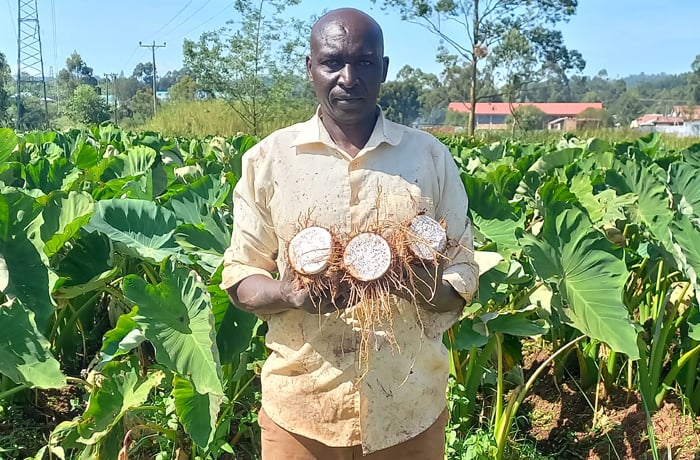Many residents of Kisii County have embraced the practice of setting aside lower portions of their farms, particularly those near rivers or springs, for the cultivation of Eucalyptus trees.
Following a decline in the tea farming industry in the country, numerous Gusii farmers turned to Eucalyptus cultivation as an alternative source of income. However, for James Nyagwoka, a 63-year-old farmer, the idea of growing these trees never crossed his mind as a savior.
Instead, he decided to venture into arrowroot farming in his village of Kegati, within the Nyaribari Chache constituency. This choice marked the beginning of a farming journey that has spanned over two decades, fueled by his determination to succeed in life after struggling with casual jobs.
Today, Mr. Nyagwoka stands as one of the most successful arrowroot farmers in Kisii County, if not the entire nation.
The Akilimali team recently visited his farm to gain insight into his remarkable journey, which not only allowed him to provide education for his five children, including sending them to universities, but also enabled him to build a modern home where he resides with his wife.
Mr. Nyagwoka fondly recalls how his venture into arrowroot farming started almost as a pastime with just 200 arrowroot seedlings. These seedlings were planted near a river on the land he had inherited from his father. Over time, he managed to propagate and cultivate more, leading to his current impressive count of over 100,000 arrowroot plants.
Contrary to the common belief that arrowroot requires a lot of water, Mr. Nyagwoka attests that arrowroot can thrive in various soil conditions, as long as it has good drainage, fertile soil, and is free from stones.
He emphasizes the importance of learning from successful farmers in the specific field one wishes to venture into before starting. Such knowledge-sharing can provide valuable insights and techniques to implement upon returning to one’s farm.
However, like any agricultural endeavor, arrowroot farming has its challenges, including the risk of theft. Nevertheless, Mr. Nyagwoka remains undeterred, as the remaining arrowroot plants continue to bring him substantial profits.
He predominantly cultivates arrowroot varieties with fully grown green leaves, as he believes they perform exceptionally well. While there are other varieties with purple leaves, Mr. Nyagwoka prefers the ones with mature green leaves for optimal growth.
He explains that a single row of 50 meters, with mature arrowroot plants, can yield up to Ksh 15,000.
In a year, Mr. Nyagwoka generates over Ksh 600,000 from the sale of arrowroot cultivated on his six-acre farm. Most of his customers are from the town of Kisii, where they purchase small bags of arrowroot for Ksh 3,000 each.
He proudly mentions that he now has customers from major cities like Nairobi and Nakuru. They visit his farm to purchase arrowroot directly and transport it themselves. This allows him to save on transportation costs.
To ensure a constant supply of arrowroot for his customers, Mr. Nyagwoka strategically divides his farm into sections with different maturity stages of the crop. Some sections have arrowroot that is two months old, while others are four months old or more. This arrangement allows him to harvest at different times, ensuring his customers are never in short supply.
Mr. Nyagwoka has also taken it upon himself to train fellow farmers in the village who are gradually venturing into arrowroot farming. He provides free training to help them improve their livelihoods.
In addition to this, he actively participates in agricultural exhibitions to expand his knowledge and keep abreast of the latest farming practices.
“Laini nne za nduma zinaweza kunipa Sh60,000 kwa mwaka. Kati ya hizo pesa, ninaweza kutumia Sh40,000 kununua mahindi nitakayoyala na familia yangu mwaka mzima. Kwa hivyo, kilimo hiki kina ukwasi,” he proudly states.
Arrowroot is a versatile crop that can be used for various purposes, including breakfast meals. It is also rich in minerals like starch.
James Nyagwoka’s success story serves as an inspiring example of how determination and dedication to a chosen field can lead to not only personal prosperity but also contribute to the economic growth of Kenya. His willingness to share his knowledge and support fellow farmers underscores his commitment to helping his community thrive through agriculture.

